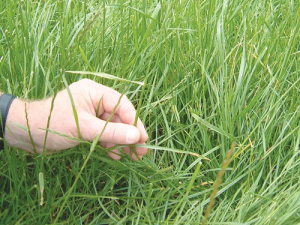More farmers renewing pasture – still more to go
Renewing 10% of New Zealand farm pasture annually would ensure productivity and performance gains achieved via new species do not dwindle over a 10-year cycle.
 Pasture renewal rates throughout NZ are very low – at around 2.5% for sheep and beef farms and only 8% for dairy farms.
Pasture renewal rates throughout NZ are very low – at around 2.5% for sheep and beef farms and only 8% for dairy farms.
Despite plenty of evidence showing the clear benefits of renewing pastures, renewal rates in New Zealand remain very low, claims the Pasture Renewal Charitable Trust.
“Pasture renewal rates nationwide are very low – around 2.5% for sheep and beef farms and only 8% for dairy farms,” says the trust’s project manager Tim Wood.
“Yet there are plenty of reasons and evidence available to suggest it is beneficial to renew older pastures.”
Wood says though research shows many farmers know the benefit of planting new pastures, many perceive barriers, including: it is expensive; new grasses don’t persist; they need greater maintenance; it is too hard (to take paddocks out of production/difficult to fit into current farm management etc); and planting new pastures is an ‘intensive’ farming practice unattractive to farmers who regard themselves as running low input farming systems.
“The end result is that some farmers may appreciate the benefits, but do not have the knowledge or confidence to give it a go,” Wood says. “However, done properly the risks are minimised.”
He says there is a big difference between a farm’s poorest producing pastures and its best paddock. “That difference in dry matter production will be having an impact on your bottom line.”
He says modern forage cultivars have been bred to improve productivity and offer benefits such as: they establish quickly; produce more dry matter per hectare; resist pests and disease better; are more palatable, making them easier to manage; have a higher feed value (ME) so stock do better; grow more feed than weed grasses in winter and summer conditions; and are a variety of cultivars bred for specific conditions to suit every farm type and operation.
Wood says replacing poor-producing paddocks with new pasture is profitable, and “one of the simplest ways to invest onfarm for a significant and relatively predictable return”.
He adds that the higher a farm’s performance, the more it can gain from intensifying its pasture renewal.
“But the benefits of pasture renewal are easily achieved in any sort of farming operation. Pasture renewal is not just a ‘high input’ farming practice; it can be incorporated into any farm management programme. And the benefits are obtainable on all grazing-based enterprises.”
Horticulture New Zealand (HortNZ) has added its perspective to numerous primary sector voices urging the Government to strengthen its draft legislation to replace the Resource Management Act (RMA).
The Commerce Commission has finalised new information disclosure requirements for local councils and water organisations that deliver water supply and wastewater services.
Beef + Lamb NZ (B+LNZ) is calling for significant changes to the Government’s reforms to the Resource Management Act (RMA).
NZPork says the Government needs to strengthen its proposed planning laws to ensure New Zealand's pig farmers can continue to produce pork.
Good news for kiwifruit growers - a record crop with forecast per hectare returns at record levels for all fruit categories for the 2025-26 season.
As guests gathered on what is known as the Speaker's Lawn - a beautifully manicured patch of grass behind the main buildings of Parliament - to mingle and enjoy a lamb chop to celebrate National Lamb Day, the mood was very much upbeat.